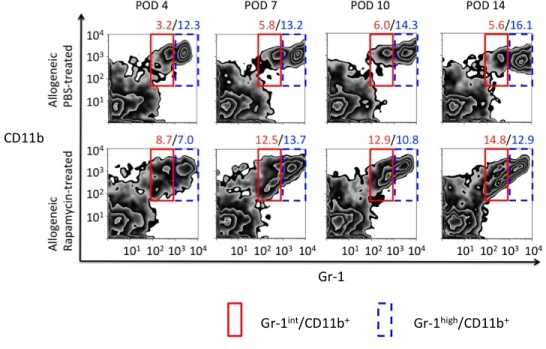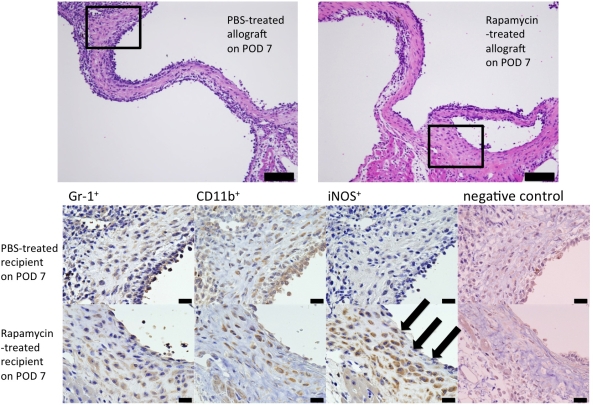Rapamycin Prolongs Cardiac Allograft Survival in a Mouse Model by Inducing Myeloid-Derived Suppressor Cells.
Department of Organ Transplantation and General Surgery, Kyoto Prefectural University of Medicine, Kyoto, Japan.
Meeting: 2016 American Transplant Congress
Abstract number: B32
Session Information
Session Name: Poster Session B: Allograft Rejection, Tolerance, and Xenotransplantation
Session Type: Poster Session
Date: Sunday, June 12, 2016
Session Time: 6:00pm-7:00pm
 Presentation Time: 6:00pm-7:00pm
Presentation Time: 6:00pm-7:00pm
Location: Halls C&D
Mammalian target of rapamycin (mTOR) inhibitors are the main immunosuppressive drugs for organ transplant recipients. Nevertheless, the mechanisms by which mTOR inhibitors induce immunosuppression is not fully understood. Myeloid-derived suppressor cells (MDSCs) maintain host immunity; however, the relationship between mTOR inhibitors and MDSCs is unclear. Here, the results from a murine cardiac transplantation model revealed that rapamycin treatment (3 mg/kg, intraperitoneally on post-operative days 0, 2, 4, and 6) led to the recruitment of MDSCs and increased their expression of programmed death-ligand 1 and inducible nitric oxide synthase (iNOS)  . Immunohistochemical analysis revealed that rapamycin induced the migration of iNOS-expressing MDSCs into the subintimal space within the allograft vessels, resulting in a significant prolongation of graft survival compared with that in the untreated group (67 days vs. 7 days, respectively)
. Immunohistochemical analysis revealed that rapamycin induced the migration of iNOS-expressing MDSCs into the subintimal space within the allograft vessels, resulting in a significant prolongation of graft survival compared with that in the untreated group (67 days vs. 7 days, respectively) . These effects were counterbalanced by the administration of an anti-Gr-1, which reduced allograft survival to 21 days. Moreover, adoptive trans-coronary arterial transfer of MDSCs from rapamycin-treated recipients prolonged allograft survival with the increased existence of CD4+/Foxp3+ regulatory T cell in the spleen and allograft; this prolonged survival was reversed by the anti-Gr-1 antibody. Finally, co-administration of rapamycin and a mitogen-activated protein kinase kinase (MEK) inhibitor trametinib reversed rapamycin-mediated MDSC recruitment. Thus, the mTOR and Raf/MEK/extracellular signal regulated kinase (ERK) signaling pathways appear to play an important role in MDSC expansion following cardiac transplantation.
. These effects were counterbalanced by the administration of an anti-Gr-1, which reduced allograft survival to 21 days. Moreover, adoptive trans-coronary arterial transfer of MDSCs from rapamycin-treated recipients prolonged allograft survival with the increased existence of CD4+/Foxp3+ regulatory T cell in the spleen and allograft; this prolonged survival was reversed by the anti-Gr-1 antibody. Finally, co-administration of rapamycin and a mitogen-activated protein kinase kinase (MEK) inhibitor trametinib reversed rapamycin-mediated MDSC recruitment. Thus, the mTOR and Raf/MEK/extracellular signal regulated kinase (ERK) signaling pathways appear to play an important role in MDSC expansion following cardiac transplantation.
A part of this study was published in Am J Transplant, 2015; 9: 2364-2377.
CITATION INFORMATION: Nakamura T, Masuda K, Matsuyama T, Ushigome H, Yoshimura N. Rapamycin Prolongs Cardiac Allograft Survival in a Mouse Model by Inducing Myeloid-Derived Suppressor Cells. Am J Transplant. 2016;16 (suppl 3).
To cite this abstract in AMA style:
Nakamura T, Masuda K, Matsuyama T, Ushigome H, Yoshimura N. Rapamycin Prolongs Cardiac Allograft Survival in a Mouse Model by Inducing Myeloid-Derived Suppressor Cells. [abstract]. Am J Transplant. 2016; 16 (suppl 3). https://atcmeetingabstracts.com/abstract/rapamycin-prolongs-cardiac-allograft-survival-in-a-mouse-model-by-inducing-myeloid-derived-suppressor-cells/. Accessed February 18, 2026.« Back to 2016 American Transplant Congress
